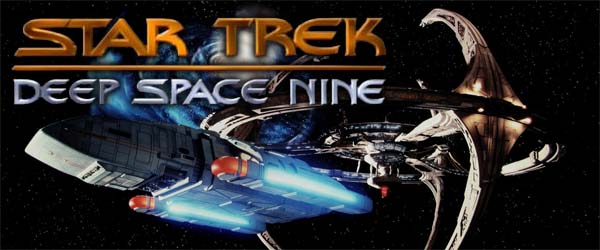
In the age of streaming and binge-watching here in the year 2023, long-form serialized television is now ubiquitous. Every network and streaming service has wanted its own blockbuster TV shows. Whether it's AMC's The Walking Dead and Breaking Bad, HBO's Game of Thrones, Sci-Fi's Battlestar Galactica, Netflix's House of Cards and Stranger Things, History's Vikings, and so forth, it seems that every big new show outside of sit-coms has a heavily-serialized format. Procedural dramas are going the way of the dinosaur.
Serialized, long-form television may be commonplace now, but back in the 1990's, it was virtually unheard of outside of daytime soap operas (such as Dallas and Dynasty) and the occasional network mini-series. At least, this was the case in the United States. British television has a much longer track record of serialized story-telling. A big part of why serialized television was uncommon was that the producer(s) of network syndicacted shows didn't have as much control over when its affiliates decided to air the shows, or how heavily they would market and advertise it. Furthermore, the networks or affiliates could change the time slot of the show pretty much at a whim. Viewership, therefore, would be much more fickle and fractured. Audiences would pop in and drop out. Expecting the audience to have seen every previous episode in preparation for this week's episode was a dangerous and risky expectation for a production studio. It's easy to lose viewers if none of them know what's going on.
 - Game Of Thrones, copyright HBO
- Game Of Thrones, copyright HBO
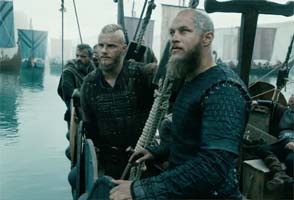 - Vikings, copyright History Channel
- Vikings, copyright History Channel
Highly serialized, long-form drama are the norm for modern networks and subscription television services.
As I mentioned in the previous essay, this was the case with me. I was in elementary school and middle school during DS9's run, and I missed a lot of episodes in the first couple seasons, despite wanting to watch the show. Missing so many episodes meant that I had very little idea what was going on when I would watch, and so I mostly lost interest in the show. If my dad was watching it, and I was there, I'd watch it, but I wasn't planning my day around it.
Looking back now, that sort of serialized story-telling is now ubiquitous and expected, and so it's easier to recognize that Deep Space Nine was truly innovative and ahead of its time in this regard.
Long-form story-telling
Serialized story-telling wasn't alien to Star Trek. Deep Space Nine premiered in 1993, the same year as the sixth season of Next Generation. By this time, The Next Generation had several story threads that had recurred over the course of a season, or over multiple seasons -- as well as several attempted overarching plot threads that were dropped.
As early as the first season of Next Generation, Q had become a recurring antagonist, and his "judgement" over the human race was established as a recurring plot thread. Heck Q's judgement of humanity was originally depicted as the framing mechanism for the entire show! It was scaled back in the following seasons due to the general poor reception of the first season, and the fact that John de Lancie just works better in a more whimsical and comic role.
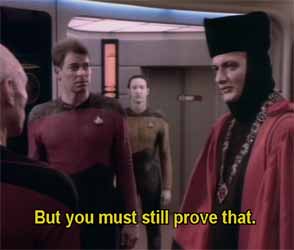 - TNG "Encounter At Farpoint", season 1, episode 1
- TNG "Encounter At Farpoint", season 1, episode 1
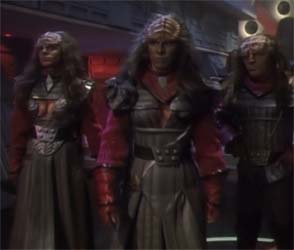 - TNG "Redemption, Part I", season 4, episode 26
- TNG "Redemption, Part I", season 4, episode 26
TNG had several recurring plot threads.
The final two episodes of Next Generation's first season, "Conspiracy" and "The Neutral Zone", seem to have been part of an abandoned attempt at more long-form story-telling. Both seem to be trying to establish some new threat to the Federation (and possibly a shared threat between the Federation and other rival powers such as the Romulans). I think the original idea was for this to become an overarching storyline for the entire series. But the thread from "Conspiracy" was completely dropped, and the destroyed colonies referenced in "The Neutral Zone" were re-written to be retroactive foreshadowing of the Borg's appearance in season 2.
[More]
cddb26c9-ca5a-4327-b199-d0d00dec522b|0|.0
Tags:Star Trek, Star Trek: Deep Space Nine, Federation, Starfleet, progressivism, humanism, secularism, religion, fundamentalism, fascism, terrorism, war, trans-gender, Worf, Odo, Quark, Moogie, Ishka, Bajor, Dominion, Founder, Changeling, Jem'Hadar, Cardassian, streaming television, Game of Thrones, Battlestar Galactica, the X-Files, Babylon 5, Buffy the Vampire Slayer, The Sopranos, Lost, Twin Peaks

The Next Generation, Deep Space Nine, and (depending on who you talk to) Voyager are widely regarded as the "Golden Age" of Star Trek. Since many Trekkies look back at this time period of the late 80's and 90's with the rose-tinted glasses of nostalgia, it might surprise you to read that Deep Space Nine used to be a highly divisive topic among Star Trek fans. Even to this day, I've talked to "hardcore" Trek purists who dislike Deep Space Nine because of how dark and conflict-driven the series is. I can't imagine what these people must think of the Kelvin-verse reboots, Star Trek: Discovery, or Picard. If you think I'm hard on those recent iterations of Star Trek, then you should talk to these people!
In any case, the idea that DS9 is too dark and conflict-driven is a valid criticism from someone coming from the perspective of a fan of The Original Series and Next Generation. Both of those shows were about an idealistic future in which humanity had grown out of its petty squabbles and now seeks to better itself through cooperative exploration and colonization of space. Deep Space Nine didn't quite accept those ideas at face-value. Deep Space Nine's more pragmatic approach had some fans believing that Deep Space Nine violated the spirit of Star Trek.
Many fans of The Original Series and Next Generation criticized Deep Space 9 for being "too dark".
Deep Space Nine was also the first Trek series to be highly serialized, having a singular, overarching plot throughout most of the series, and with frequent mini-arcs running for half a season or a whole season. TNG had its share of recurrent story arcs. Q's "trial of humanity" was pitched as a framing mechanism for the entire show, but ended up only serving to bookend the series, while relegating most of Q's appearances each season as comic tangents. There were other recurrent sub-plots as well, such as Worf's discommendation from the Klingon Empire and his conflict with the Duras House in the "Sins of the Father" arc, the Borg story thread, Data's relationship with his brother Lore, Wesley's training as a Starfleet officer, and a few others. But TNG stayed mostly episodic. Almost all the single episodes of TNG (and the two-parters as a whole) can be enjoyed independently, without having seen any previous episodes of TNG. That was not the case with DS9.
I missed many episodes of DS9 because
it aired on weekend evenings.
DS9 was on the air throughout my elementary school and middle school years (I was seven when the show premiered). It frequently aired (syndicated on Fox in my region) on weekend evenings, and I was often outside playing tag, riding bikes, or playing touch football or street basketball with neighbor kids. As such, I missed a lot of episodes. Due to the highly-serialized nature of the show, when I would see an episode, I would have no idea what was going on! Because I rarely watched the show, and didn't understand it when I did see it, I didn't particularly like it. I'd still watch it, because it was still Star Trek. In fact, Voyager was the first Star Trek series that I watched regularly (it being on Wednesday nights, when I wasn't outside playing), and, well, you all know how I feel about Voyager.
In fact, I grew up with a bit of a preconceived notion that Deep Space Nine was the "bad" Star Trek series -- even though critics at the time largely appreciated it. On the off chance that I could talk about Star Trek with a peer, they generally didn't like DS9 either -- for many of the same reasons.
It wasn't until my college years, when the show was released for sale on DVD that I sat down and watched the whole series from start to finish. At first, I wasn't even sure if I wanted to bother buying the DVDs. After all, DS9 was "the bad Star Trek". So why spend the money? And those DVDs cost a lot of money! CBS wanted something like $120 for a single season, compared to $30 or $40 a season for shows like E.R. or Grey's Anatomy. At least the Next Gen DVDs came in fancy, sturdy boxes. The DS9 DVDs came in cheap, flimsy, rigid plastic booklets that start to fall apart as soon as you open them. I think my mom bought them from Costco for $90 a pop -- a considerable discount, but still obnoxiously expensive!
CBS wanted $120 per season for DS9 DVDs!
I was now older. I was coming to terms with my personal identity as a progressive secular humanist. Most importantly, I could finally follow along with the various multi-episode story threads and the complex, nuanced characterizations. And boy, did my opinions on the series change!
I'll always have a soft spot for Next Generation. That show has my favorite Trek character: Data. And Picard is probably my third favorite character after Spock. After my single favorite episode of Trek, the Original Series' "Balance of Terror", most of my runner-up favorite episodes are TNG episodes. Episodes like "The Measure of a Man", "Who Watches the Watchers", "The Offspring", "The Best of Both Worlds", "Deja Q", "I, Borg", "Tapestry", "The Inner Light", "Darmok", "All Good Things...", and so on...
Despite my fondness for Next Generation, I actually think that Deep Space Nine is the better all-around show.
Every Trek series since the original has taken a couple years to really find its footing. TNG doesn't really figure itself out until midway through season 2, and Voyager takes until the 4th season to figure itself out -- if ever. I don't know if Discovery ever righted its ship, since I didn't bother to watch past the first season, and Picard didn't even become watchable until the third season. I feel like DS9 finds its footing much earlier than TNG or Voyager. Deep Space Nine's characters, themes, and stories start to fall in place by the end of season 1. In fact, one of my favorite episodes of the entire series (and one of my favorite episodes of Trek in general) is a season 1 episode: "Duet". DS9 is the only Trek series (since the original) for which one of my favorite episodes comes as early as the first season.
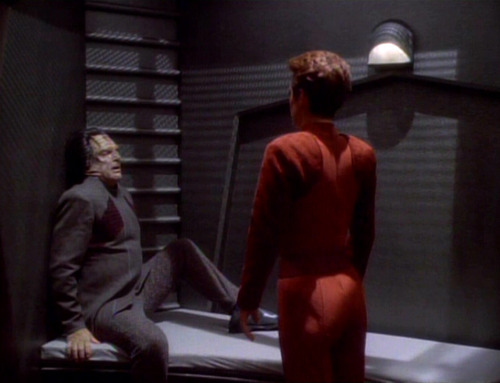 - DS9 "Duet", season 1, episode 19
- DS9 "Duet", season 1, episode 19
One of my favorite DS9 episodes (and Trek episodes in general) is the season 1 Holocaust allegory, "Duet".
The last episode of season 1, "In the Hands of the Prophets" starts to set up the season-long arcs (and a series-long arc) that would become a trademark of the series. That episode introduces us to recurring villain Vedek Winn and starts the process of her gradual accumulation of power, which we'll talk about later.
But despite the series coming together better in the first season, critics of Deep Space Nine aren't wrong when they say that it "feels different" from the Original Series or Next Generation. The show is unarguably darker and more conflict-driven. The entire second half of the series is about an interstellar war, and the seasons leading up to that repeatedly tell stories about domestic terrorism, Holocaust allegories, religious persecution, and cynical politics. These sorts of themes were present in episodes of TOS and TNG here and there, but DS9, at a fundamental level, was about these difficult topics.
[More]
79b833d8-97bd-4e2f-b45e-9f666db1588a|1|5.0
Tags:Star Trek, Star Trek: Deep Space Nine, Gene Roddenberry, Federation, Starfleet, culture, ideals, cooperation, socialism, post-scarcity economics, alien, multi-culturalism, progressivism, humanism, secularism, terrorism, war, Benjamin Sisko, Kasidy Yates, Odo, Quark, Ferengi, Klingon, Cardassian, Dominion, Bajor
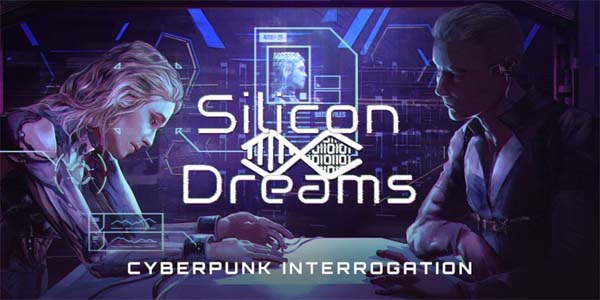
It is going to be impossible to ignore the comparisons between Silicon Dreams and Papers, Please. This game was basically pitched to me as "Papers, Please but sci-fi". I loved Papers, Please, and I love sci-fi, so I bought it. As is typical for indie games, it sat in my Steam backlog for well over a year until the post-holidays release draught gave me a chance to dive into that backlog.
Basically, the player of Silicon Dreams plays as an android working as quality assurance for a monopolistic android-manufacturing conglomerate. You interview damaged or defective androids in order to determine if they need repairs, or if they can be returned to their owners, or if they are so badly damaged that they need to be "decommissioned" entirely. However, these are sentient androids, with feelings. Even repairs require wiping the android's memory, which destroys any personality they have developed and erases everything they've learned. Further, the corporation also has its own expectations and public relations that the player must consider. In some cases, the corporation pre-determines what they want you to do with the android in question and expect you to rubber stamp what is, effectively, an execution.
Your corporate overlords have expectations for your performance.
As the cases go on, they become more complicated and enter into moral and ethical grey areas. The game brings up compelling questions regarding A.I. ethics. Are the androids truly sentient? Or are they merely simulating sentience? Where is the line between an "appliance" and a "slave"? What is the responsibility of the corporation and of broader society towards these androids? Are you complicit in the company's mis-treatment of androids merely by working for them, even if you try to walk the tightrope of following your conscience whenever possible, while also keeping a low profile? And so forth.
Electric sheep
The interview process is mostly straight forward. There's a wheel of topics, and each topic has one or more questions. However, the android may not be willing to answer all of your questions. Each android has a set of emotions as well as a trust level with the player. The android will only give answers to certain questions if they're in the proper emotional state or if they trust the player enough to give an answer to a sensitive or incriminating question.
The player has to manipulate the
subject's emotions and trust levels.
You have to manipulate the subject's emotions, but these emotions change and degrade with each new line of dialogue. You have a set of generic questions related to each of the subject's emotions, and also one about trust. But you can only ask each of these once. If you run out of questions to ask about a particular topic that triggers an emotional reaction, then you can potentially become locked out of getting answers to other questions that are locked behind certain emotion thresholds.
As such, you have to be very careful and thoughtful about which questions you ask, and in what order. You have to kind of probe into each topic to find out if the subject is going to clam up, so that you can change topics to try to manipulate them into opening up. In some cases, you may have to scare a subject into a confession. If you use up your threats early, before you how to get that confession, then the intervening topics may defuse the subject's emotional state to the point that it is impossible to get them afraid enough to make the confession. [More]
5212e514-77eb-4be4-8ab1-764486fcf98e|0|.0
Tags:Silicon Dreams, Clockwork Bird, indie gaming, Steam, PC, science fiction, android, rights, civil rights, interrogation, quality assurance, morality, ethics, corporate dystopia, bureaucracy, dystopia, terrorism, Papers Please
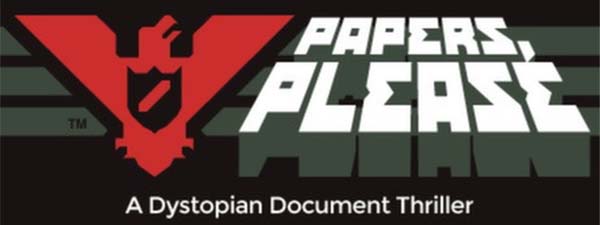
With Dark Souls III behind me, and while I wait for the inevitable time-eater that will be Civilization VI, I wanted to go back through my backlog of smaller games. Papers, Please is a simple little indie title that has been out for almost three years (at the time of this writing), and has been sitting in my Steam library, unplayed, for quite some time. Now seemed like as good a time as any to rectify that.
I just paid to go to a second job that I don't get paid for
Papers, Please is a funny little game in that it is so dedicated to its theme that the game actually does start to feel almost like a real job. You have to click and drag to open up documents, sort through papers, check dates, make sure the document was issued in a valid city, and so on. It's a lot of mundane work, and if you miss any little detail, then you have an omniscient boss who will print out a citation. I quickly came to anticipate the sound of a citation being printed with a Pavlovian anxiety after sending applicants through, even for the ones whose documents I thought I had thoroughly checked. You get two warnings before your omniscient boss starts docking your pay, which keeps constant pressure on you to try to be as close to perfect as possible. Paying for this game is almost like paying for a second job that you, yourself, don't get paid for. And it's kind of a shitty job, at that.
It's not just the potential immigrants' problems that you have to think about. You have your own problems. Every day, you go home with a measly salary, and you have to pay daily for rent, heat, and food for yourself and your family. Maybe you kids or wife get sick, and you have to spend some precious extra dollars on medicine that night. And if your pay gets docked for letting in people with invalid passports, then you might have to go that night without food or heat or medicines, which will just make your family more likely to get sick.
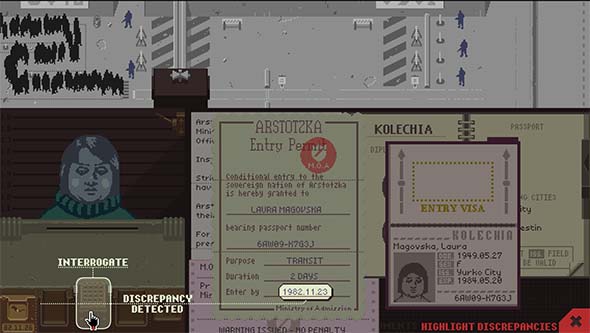
Hooray! A game in which I get to shuffle paper work and perform bureaucratic government functions!
You'll also have people with invalid documents begging to let you in to the country so they can be re-united with their families, or because they're political refugees who will be killed if they go back to their own country... [More]
560b72c3-4d76-45af-9bd1-68ecbaedde74|0|.0
Tags:Papers Please, indie gaming, 3909, Lucas Pope, immigration inspector, passport, customs, checkpoint, bureaucracy, interrogation, puzzle, Arstotzka, war, civilian, terrorism, spy, dystopia, communism, noire, PC, Steam
|

| 12 | | | | | | | 60 | | 11 | | | | | | | 55 | | 10 | | | | | | | 50 | | 09 | | | | | | | 45 | | 08 | | | | | | | 40 | | 07 | | | | | | | 35 | | 06 | | | | | | | 30 | | 05 | | | | | | | 25 | | 04 | | | | | | | 20 | | 03 | | | | | | | 15 | | 02 | | | | | | | 10 | | 01 | | | | | | | 05 |
|